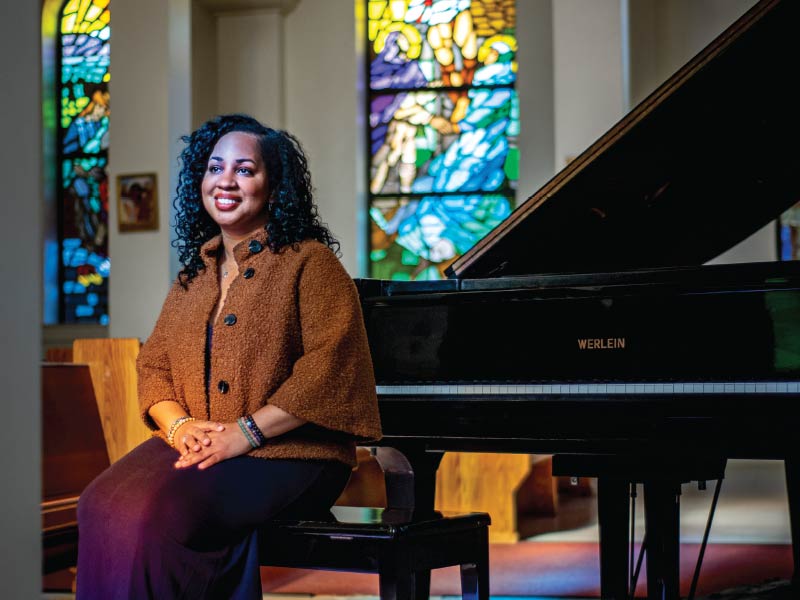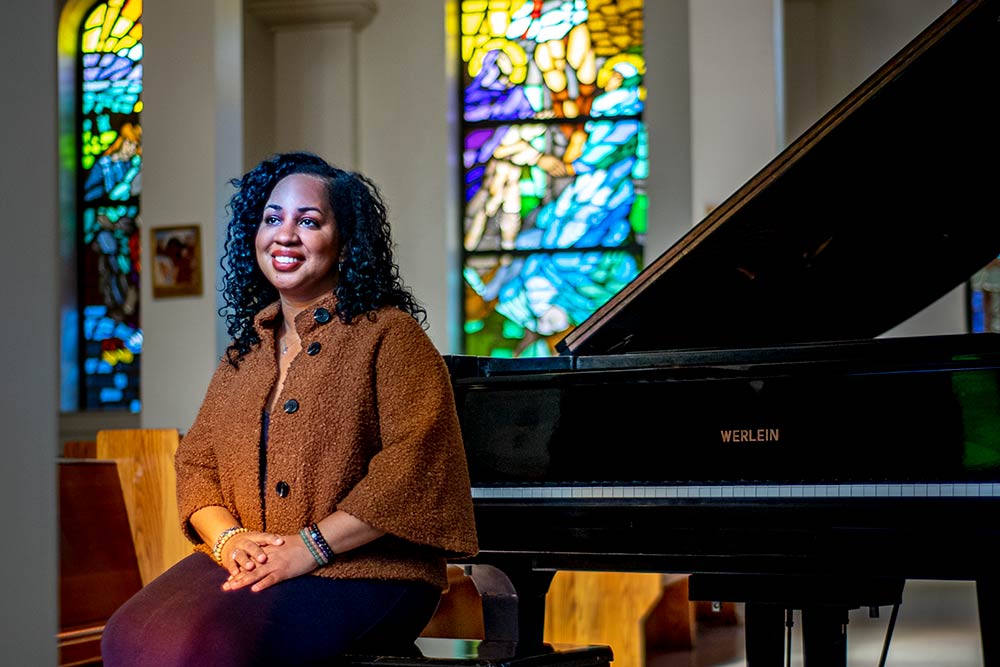

The Music We Know
by Emily Wilkerson
Originally published in the Tulane School of Liberal Arts Magazine, Winter 2022
An Interview with Courtney Bryan Exploring Collaboration and Improvisation
Composer, pianist, and New Orleans native Courtney Bryan, professor in the Newcomb Department of Music, has won numerous awards and worked with artists and ensembles around the world. Bryan learned from many of New Orleans’ great musicians and composers, from Clyde Kerr and Ellis Marsalis to Kidd Jordan and Daniel Weilbaecher. As she embarks on research, writing, and composing for new musical and concerto projects with Bard College in New York and the Los Angeles Philharmonic, Emily Wilkerson sat down with Bryan to discuss her career, collaboration, improvisation, and how the foundational tools of her practice can help us prepare for the future.
Emily Wilkerson (EW): Tell me a little about how you came to be a composer and performer.
Courtney Bryan (CB): Ever since I was around four, we had a piano in the house. My oldest sisters took piano lessons, but I would just kind of play around on the piano and enjoyed hearing the sounds it made. At five, I started studying piano. I would practice these lessons and then I would take them and improvise from them. After that, I started composing my own music.
I also had a wonderful kindergarten teacher who had a piano in the classroom that she would play before naptime. I stayed with her after class one day and showed her a piece I composed. After that, she started inviting me to her apartment to teach me how to write music. I learned the basics from her, and still remember drawing musical notes in pencil with her. The point is, early on I learned how to write out my ideas. And I kind of taught myself how to compose from studying piano.
EW: How do the practices of composing and performing inform each other?
CB: Composing and performing have always come together for me. When I was at the New Orleans Center for Creative Arts (NOCCA) for high school, I started writing music for some of my friends who were also musicians, and that’s really how I learned to write for different instruments. I almost included the whole class in my senior recital.
EW: I imagine there are a few names we might recognize that you were already composing for in high school!
CB: Yes, Christian Scott and I were classmates, as well as Trombone Shorty and Natasha Harris. Everyone there really worked together. In my last year of high school I started studying composition formally through lessons with Roger Dickerson, who taught me a lot about writing for an orchestra. Mr. Dickerson also taught me about the history of black composers. Then, I went to Oberlin College and Conservatory and studied performance and composition, and later returned to New Orleans to organize my own gigs around town. My first gig was at Sweet Lorraine’s (jazz club)! After a stint back home, I studied jazz piano at Rutgers University, and straight from there I studied composition again at Columbia University, where I learned from George Lewis. I love to perform and compose, but there is always a focus on composition whether I am creating for others or myself. Composition is the anchor. I often ask myself, what is the one thing that if you didn’t do it, wouldn’t happen? I think my unique contribution to the world is my composition.
EW: What are some of the elements of life that inspire your work?
CB: The theme of freedom continues to show up for me. Spirituality, and my own spirituality in particular, is also a theme. The word “love” and the idea of home are also very important to me. These are the concepts that inspire me and continue to show up in my work, but I also find inspiration in historical and contemporary public figures. In addition, I’ve recently made several works about police brutality with a focus on black women, such as Saved (2013), a collaboration with Kara Lynch in response to the 1911 lynching of Laura Nelson and her son, and Elegy (2018), which was commissioned by Ensemble Pi as a response to the iconic jazz piece, Strange Fruit. In 2015, I also composed Spirits, which is sometimes performed as a piano solo or with other instruments, and features a “rumble” that is present in my recent works—a dense saturation of sounds. Towards the end as I introduce other melodies, I read the names of victims of police brutality. Each time I have performed it, there are unfortunately different names to add, so I choose a few, alternating between men, women, boys, and girls.
Yet Unheard for chorus, orchestra, and soprano, is a dedication to Sandra Bland and was commissioned and premiered by The Dream Unfinished, an activist orchestra for a 2016 fundraiser/concert #SingHerName. Collaborating with poet Sharan Strange and vocalist Helga Davis, I composed the music for this premiere, which has since been performed in the original and chamber versions in different cities with different conductors, choruses, and orchestras.
EW: You grew up in New Orleans and the city is still your home today. Do you feel like New Orleans plays a role in your creative process and the music itself?
CB: The way that music is part of everything here is important. I think the fact that it is cool to be a young person in a band in New Orleans, and how brass bands play contemporary popular music, is inspiring! I was part of the marching band at McMain High School, and playing clarinet in the marching band during a Mardi Gras parade was a hallmark experience for me. Another inspiration for me growing up here was my church, St. Luke’s Episcopal. It is an Anglican church and the music has strong Caribbean influences. It has its own identity, and I think that church taught me how natural it is to combine different cultural influences.
EW: How beautiful. Considering these influences, can you share more about how you consider improvisation as you write music?
CB: On one level, I am an improviser. I have the experience of improvising with others and the skills that it takes to do that. Even when I’m writing music that doesn’t include improvisation for others, it changes how I write. For example, if I’m writing for orchestra, I would write in a way that might create the same feeling of improvisation. And it really gets technical—it’s about getting into the notation in such detail that you can really help performers understand your vision. Trying to create something that moves beyond the music itself is related to improvisation, but it also relates to spirituality. Even if you’ve written out everything exactly as it can be, there are still points of tension between the artist and the music.
EW: I know collaboration is a very important aspect of to your practice, as well. How does collaboration play a role in your work?
CB: My teacher Kidd Jordan always emphasized the fundamentals of music. He didn’t believe in teaching style—he believed in learning your instrument and learning your theory first, then creating your own style. This question brings me back to my time with Ellis Marsalis, as well. After a two-week intensive with him, the main thing I walked away with was really how to listen to music. Listening takes a lot of skill, and this is something I always emphasize to my students.
When collaborating, listening, in particular, is key. Especially if you’re collaborating across different art forms or fields, which I love to do, communication and listening are important to move forward together. If you take time to build your personal foundations, and decide what your intentions are together, then you can be free to create something new together. I think this holds true both in making music and in everyday life.
EW: How can collaboration and improvisation be tools for us all as we work toward a bright future together?
CB: I think collaboration is such an important skill for society. The current pandemic has definitely taught us how connected we all are. Collaboration helps us listen, work together to build structures, and learn how to be flexible. And flexibility comes out of improvisation, in finding the balance of what is and is not needed in a particular time.
I’m extremely influenced by John Coltrane and his classic quartet. Coltrane was very much the leader of the group and it was his vision, but he left so much space for the other members to shine that it didn’t feel like there was just one leader. It wouldn’t have been the music we know without each member. To me, that’s the ideal: to be a leader that can give direction, while supporting others in a way that allows them to be their truest self.

